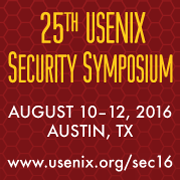
Get more
Help Promote graphics!
Venkatanathan Varadarajan, Thomas Ristenpart, and Michael Swift, University of Wisconsin—Madison
Public infrastructure-as-a-service clouds, such as Amazon EC2 and Microsoft Azure allow arbitrary clients to run virtual machines (VMs) on shared physical infrastructure. This practice of multi-tenancy brings economies of scale, but also introduces the threat of malicious VMs abusing the scheduling of shared resources. Recent works have shown how to mount cross- VM side-channel attacks to steal cryptographic secrets. The straightforward solution is hard isolation that dedicates hardware to each VM. However, this comes at the cost of reduced efficiency.
We investigate the principle of soft isolation: reduce the risk of sharing through better scheduling. With experimental measurements, we show that a minimum run time (MRT) guarantee for VM virtual CPUs that limits the frequency of preemptions can effectively prevent existing Prime+Probe cache-based side-channel attacks. Through experimental measurements, we find that the performance impact of MRT guarantees can be very low, particularly in multi-core settings. Finally, we integrate a simple per-core CPU state cleansing mechanism, a form of hard isolation, into Xen. It provides further protection against side-channel attacks at little cost when used in conjunction with an MRT guarantee.
Open Access Media
USENIX is committed to Open Access to the research presented at our events. Papers and proceedings are freely available to everyone once the event begins. Any video, audio, and/or slides that are posted after the event are also free and open to everyone. Support USENIX and our commitment to Open Access.
author = {Venkatanathan Varadarajan and Thomas Ristenpart and Michael Swift},
title = {Scheduler-based Defenses against {Cross-VM} Side-channels},
booktitle = {23rd USENIX Security Symposium (USENIX Security 14)},
year = {2014},
isbn = {978-1-931971-15-7},
address = {San Diego, CA},
pages = {687--702},
url = {https://www.usenix.org/conference/usenixsecurity14/technical-sessions/presentation/varadarajan},
publisher = {USENIX Association},
month = aug
}














connect with us